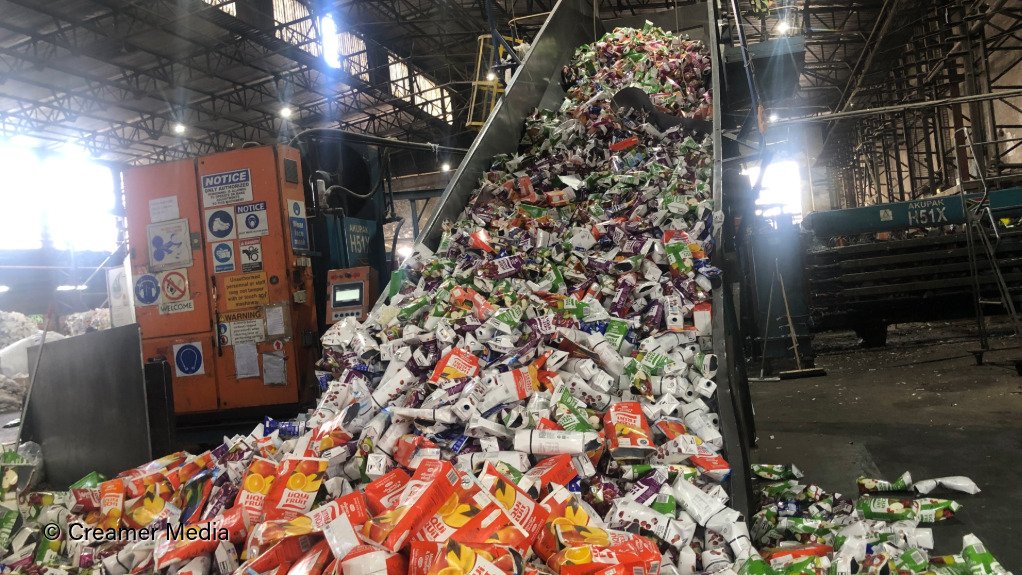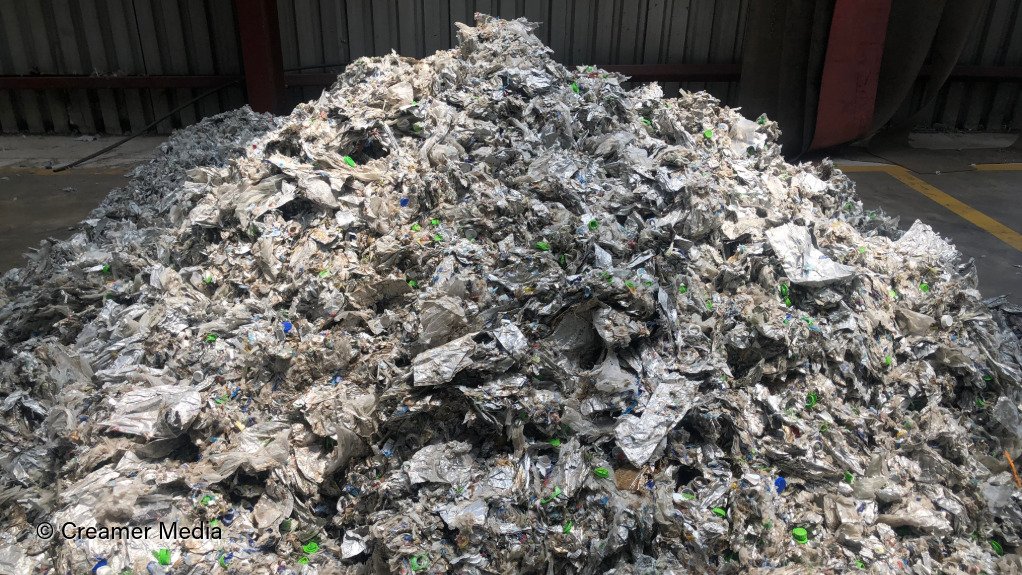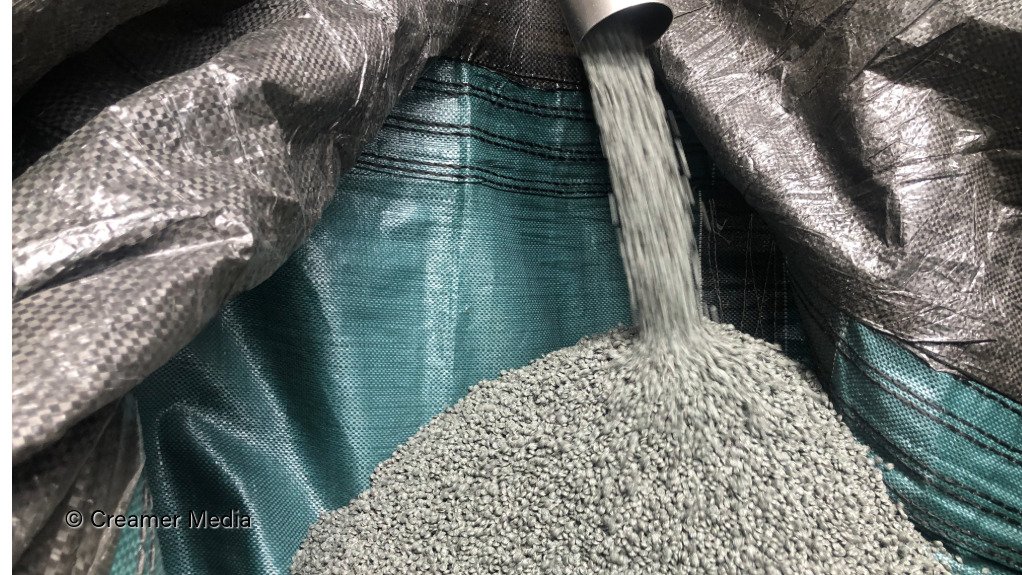Tetra Pak on track to achieve a 40% recycling rate for its products by 2030




Tetra Pak packaging about to be recycled
Photo by Creamer Media
Shredded LBP
Photo by Creamer Media
Poly alu pellets
Photo by Creamer Media
Food processing and packaging company Tetra Pak Southern Africa aims to achieve a 40% nationwide recycling rate for its liquid board packaging (LBP) products by 2030, a goal that Tetra Pak sustainability manager Masale Manoko believes might be surpassed.
“Currently, as it is, we're sitting at about 24%. So it looks like we might reach it earlier, but then we might also revise our goals in future and try and push for a higher target.
“So far, we [are] on track to achieve our 2030 ambition of a 40% recycling rate,” he told Engineering News in Germiston on November 7.
Tetra Pak is currently the only principal LBP producer in South Africa actively involved in recycling LBP through strategic partnerships with recyclers Gayatri Paper Mill, Mpact Recycling Paper Mill, as well as with producer responsibility organisation Petco and recycled products producer Infinity Industry.
The company measured an LBP recycling rate of 4% in 2022, doubling that figure to 8% in 2023, which then tripled this year.
Manoko attributed this near-exponential growth in LBP recycling to focused investments made by Tetra Pak into the collection and processing aspects of the domestic recycling industry.
“We realised that we . . . could not rely on the traditional way of increasing our recycling volumes. We deployed 11 young graduates in the nine provinces of South Africa.
“They manage buyback centres, landfills and municipality relationships . . . every day they are working with these groups of people, from waste pickers to drive collections,” he explained, noting that this had played a significant role in boosting collections.
Manoko explained that the company also invested in ensuring better monitoring and management of value chains in South Africa by introducing a system to monitor the trends, the challenges and the successes of the recycling sector.
“Using our graduates that are in the market, that allows us to be able to tactfully target each and every area and resolve the challenges that we find in those areas in a much more scientific method,” he explained.
So far, Tetra Pak has invested more than R54-million in recycling infrastructure and processes, with R17-million invested this year to enhance recycling infrastructure and R3.5-million to enhance collection systems.
Over the past two years, through these efforts, the number of buyback centres has increased from 32 to more than 220, reinforcing the collection process and creating jobs.
“We've got approved investments that will be coming up, which we will hear about in next year, hopefully, and then there are some that are ongoing. We will keep on investing in the collection and we will keep on investing in the capacitating of businesses that process recycling materials.
“We'll keep on working with others as well, through research and development, to develop products that will be coming out of our cartons. We are continuously . . . looking for new partners,” Manoko explained.
In the early 2000s, Tetra Pak realised that it would have to invest in recycling capacity to facilitate the envisioned increase in recycling rates.
This would require investments in facilities that could not only process the paper aspect of LBP packaging, but also the polymer and aluminium (poly alu) components.
“We understood that capacity was out of utmost importance, and so we started investing in the sector in the early 2000s whereby, together with Gayatri, we did a co-investment in the pulping side [of the LBP recycling process].
“We then also went on to put in a poly alu dry cleaning and processing plant, and an extrusion plant, so that they could take the poly alu and produce pellets that could go into the plastic industry,” Manoko said.
However, he explained that, since the rate of LBP carton recycling collection has increased so dramatically, further investment has been required in the processing side.
“[We invested] again this year into the [Gayatri] plant to upgrade it so that it can now process 320 t of poly alu. Poly alu is 30% of our carton, so for every 300 t of poly alu that we produce, we would have done 1 000 t of cartons,” Manoko explained.
He emphasised Tetra Pak’s investments into downstream recycled product manufacturers as well, to develop the market for products made from recycled materials.
One such company is Infinite Industries, which transforms recycled materials into products such as plastic roofing sheets, laptop stands, cable protection, furniture, beehives and housing materials, besides others.
“[At Infinite Industries], we're investing in a dry cleaning line that will be installed with them, which will help them increase their capacity,” he said.
Tetra Pak has also invested in a similar company named Regenerated Polymers, which is the first in the country to produce a modular palette that contains 40% recycled poly alu material.
Various awareness campaigns have also played a part in ramping up Tetra Pak’s recycling rate ramp-up.
Following the pilot of its educational Recycle Carton competition in the Eastern Cape last year, the company collaborated with a broader manufacturer base this year, including Orange Grove, RFG Foods and Woodlands Dairy, to increase recycling awareness in schools.
The 2024 Recycle Carton campaign aims to encourage learners to take on the responsibility of recycling. It started in September and is running in more than 320 schools across Gauteng, KwaZulu-Natal, the Eastern Cape and the Western Cape until the end of November. Tetra Pak expects this initiative will reach 300 000 learners.
Article Enquiry
Email Article
Save Article
Feedback
To advertise email advertising@creamermedia.co.za or click here
Press Office
Announcements
What's On
Subscribe to improve your user experience...
Option 1 (equivalent of R125 a month):
Receive a weekly copy of Creamer Media's Engineering News & Mining Weekly magazine
(print copy for those in South Africa and e-magazine for those outside of South Africa)
Receive daily email newsletters
Access to full search results
Access archive of magazine back copies
Access to Projects in Progress
Access to ONE Research Report of your choice in PDF format
Option 2 (equivalent of R375 a month):
All benefits from Option 1
PLUS
Access to Creamer Media's Research Channel Africa for ALL Research Reports, in PDF format, on various industrial and mining sectors
including Electricity; Water; Energy Transition; Hydrogen; Roads, Rail and Ports; Coal; Gold; Platinum; Battery Metals; etc.
Already a subscriber?
Forgotten your password?
Receive weekly copy of Creamer Media's Engineering News & Mining Weekly magazine (print copy for those in South Africa and e-magazine for those outside of South Africa)
➕
Recieve daily email newsletters
➕
Access to full search results
➕
Access archive of magazine back copies
➕
Access to Projects in Progress
➕
Access to ONE Research Report of your choice in PDF format
RESEARCH CHANNEL AFRICA
R4500 (equivalent of R375 a month)
SUBSCRIBEAll benefits from Option 1
➕
Access to Creamer Media's Research Channel Africa for ALL Research Reports on various industrial and mining sectors, in PDF format, including on:
Electricity
➕
Water
➕
Energy Transition
➕
Hydrogen
➕
Roads, Rail and Ports
➕
Coal
➕
Gold
➕
Platinum
➕
Battery Metals
➕
etc.
Receive all benefits from Option 1 or Option 2 delivered to numerous people at your company
➕
Multiple User names and Passwords for simultaneous log-ins
➕
Intranet integration access to all in your organisation





















